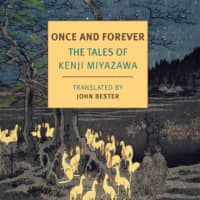The Iwate Prefecture-born poet and writer Kenji Miyazawa (1896-1933) is best-known for his story "Ginga Tetsudo no Yoru," which has been published in English as "Milky Way Railroad" (translated by Joseph Sigrist and D.M. Stroud) and under several other titles.
Once and Forever: The Tales of Kenji Miyazawa, by Kenji Miyazawa, Translated by John Bester.
288 pages
NEW YORK REVIEW BOOKS, Fiction.
Miyazawa only published two volumes — a collection of poems and another of fables — in his lifetime, but he left behind many manuscripts that were published in Japanese after his death. "Once and Forever" is a brand-new selection of 24 lesser-known, but equally delightful, tales expertly translated into English by the late John Bester.
Some tales, such as "Ozbel and the Elephant" and "Gorsch the Cellist," seem to be set in undisclosed foreign locations, but many of the stories are set in sparsely populated landscapes evocative of northern Japan. Miyazawa refers frequently to the natural world, with mentions of spindle tree berries, spike-eared grass, and fronds of pampas grass burning like "white fire."
Animals feature as characters as often as humans. In "The First Deer Dance," a group of deer, who speak in a regional dialect, are mystified by a dropped towel in the forest, which they believe to be alive. Trickster foxes appear frequently in these pages, as well as in the elegant cover art.
Unlike Western fairy tales, Miyazawa's fables are not preachy or moralistic. They often end ambiguously, and not necessarily happily. This collection showcases Miyazawa's unique imagination, and should be of interest to readers of Japanese literature of all ages.



